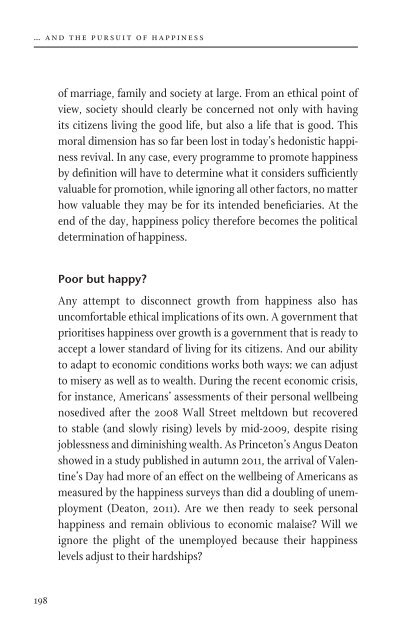… and the Pursuit of Happiness - Institute of Economic Affairs
… and the Pursuit of Happiness - Institute of Economic Affairs
… and the Pursuit of Happiness - Institute of Economic Affairs
You also want an ePaper? Increase the reach of your titles
YUMPU automatically turns print PDFs into web optimized ePapers that Google loves.
<strong>…</strong> <strong>and</strong> <strong>the</strong> pursuit <strong>of</strong> happiness<br />
<strong>the</strong> unbearable lightness <strong>of</strong> happiness policy<br />
<strong>of</strong> marriage, family <strong>and</strong> society at large. From an ethical point <strong>of</strong><br />
view, society should clearly be concerned not only with having<br />
its citizens living <strong>the</strong> good life, but also a life that is good. This<br />
moral dimension has so far been lost in today’s hedonistic happiness<br />
revival. In any case, every programme to promote happiness<br />
by definition will have to determine what it considers sufficiently<br />
valuable for promotion, while ignoring all o<strong>the</strong>r factors, no matter<br />
how valuable <strong>the</strong>y may be for its intended beneficiaries. At <strong>the</strong><br />
end <strong>of</strong> <strong>the</strong> day, happiness policy <strong>the</strong>refore becomes <strong>the</strong> political<br />
determination <strong>of</strong> happiness.<br />
Poor but happy?<br />
Any attempt to disconnect growth from happiness also has<br />
uncomfortable ethical implications <strong>of</strong> its own. A government that<br />
prioritises happiness over growth is a government that is ready to<br />
accept a lower st<strong>and</strong>ard <strong>of</strong> living for its citizens. And our ability<br />
to adapt to economic conditions works both ways: we can adjust<br />
to misery as well as to wealth. During <strong>the</strong> recent economic crisis,<br />
for instance, Americans’ assessments <strong>of</strong> <strong>the</strong>ir personal wellbeing<br />
nosedived after <strong>the</strong> 2008 Wall Street meltdown but recovered<br />
to stable (<strong>and</strong> slowly rising) levels by mid-2009, despite rising<br />
joblessness <strong>and</strong> diminishing wealth. As Princeton’s Angus Deaton<br />
showed in a study published in autumn 2011, <strong>the</strong> arrival <strong>of</strong> Valentine’s<br />
Day had more <strong>of</strong> an effect on <strong>the</strong> wellbeing <strong>of</strong> Americans as<br />
measured by <strong>the</strong> happiness surveys than did a doubling <strong>of</strong> unemployment<br />
(Deaton, 2011). Are we <strong>the</strong>n ready to seek personal<br />
happiness <strong>and</strong> remain oblivious to economic malaise? Will we<br />
ignore <strong>the</strong> plight <strong>of</strong> <strong>the</strong> unemployed because <strong>the</strong>ir happiness<br />
levels adjust to <strong>the</strong>ir hardships?<br />
When a society fails to <strong>of</strong>fer economic opportunity <strong>and</strong> jobs,<br />
people derive more wellbeing from non-economic factors. But are<br />
those who question <strong>the</strong> value <strong>of</strong> economic growth ready to impose<br />
<strong>the</strong> happiness framework <strong>of</strong> poor countries upon rich ones?<br />
Making happiness <strong>the</strong> overriding aim <strong>of</strong> public policy would<br />
bring us to accept, <strong>and</strong> even to justify, hardship <strong>and</strong> decline.<br />
This could hardly be called responsible public policy or a moral<br />
improvement.<br />
This is <strong>the</strong> implicit (<strong>and</strong> <strong>of</strong>ten explicit) aim <strong>of</strong> <strong>the</strong> happiness<br />
scholars: to drive us to value non-material goods over wealth. But<br />
this goal is based on a simplistic <strong>and</strong> paternalistic underst<strong>and</strong>ing<br />
<strong>of</strong> how human beings think about our own contentment. After all,<br />
if ever-increasing wealth yields only uncertain rewards <strong>of</strong> happiness,<br />
why do so many <strong>of</strong> us try so hard to achieve it?<br />
The truth is that increasing wealth may bring a degree <strong>of</strong> satisfaction<br />
that is difficult, if not impossible, to measure by polling<br />
personal happiness. Many <strong>of</strong> us undoubtedly strive for wealth<br />
because it enables us to achieve o<strong>the</strong>r goals – for ourselves, our<br />
families, <strong>and</strong> our communities – that <strong>the</strong> happiness surveys<br />
simply do not register. A focus on happiness over growth would<br />
thus curtail our ability to use material prosperity for non-material<br />
goals, <strong>the</strong>reby limiting our freedom to achieve contentment. By<br />
relying on a simplistic underst<strong>and</strong>ing <strong>of</strong> happiness, <strong>the</strong> happiness<br />
advocates would narrow <strong>and</strong> flatten our actual pursuit <strong>of</strong> it. There<br />
is a clear moral case against <strong>the</strong> bl<strong>and</strong> promotion <strong>of</strong> happiness<br />
over growth.<br />
Conclusion<br />
For every human being, indeed for most living creatures,<br />
198 199












